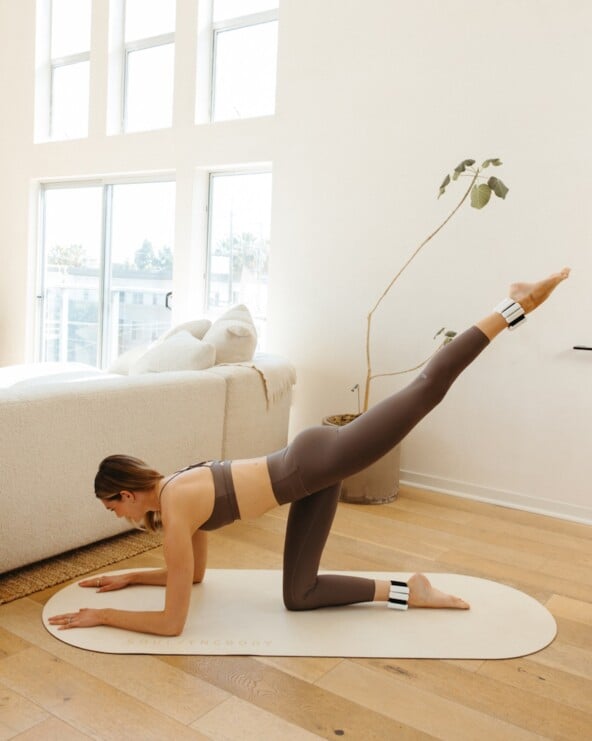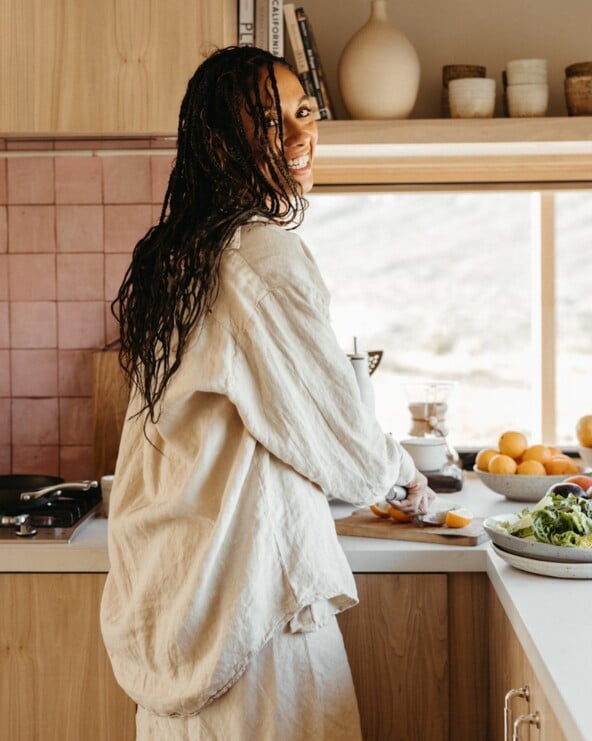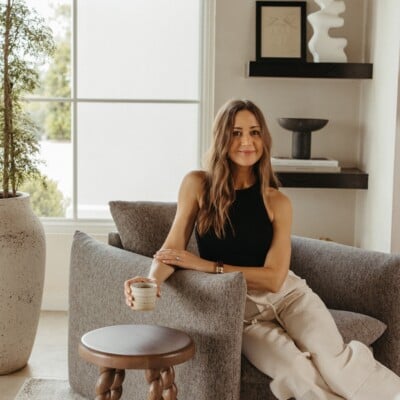I first met Danika Brysha on the Internet, one week into my first Whole30. She was doing a takeover of the Whole30 insta account, and she led with why the program works for her as a reset, then gave us a real glimpse into her super busy and layered world. In addition to being the founder/CEO of the successful startup, Model Meals, she’s also a plus-size model and an advocate of self-care, wellness and body inclusivity. Rather than focusing on modeling and running a business, she used the takeover to speak about her financial set-backs, food addiction, sobriety, and the struggles and successes of taking care of herself. The way she used her time on Whole30’s platform in such an authentic, motivating, and inspiring way made me an instant fan.
This past April, Danika and her boyfriend left California and embarked on an 8-month cross country tour with “The Brunch Series,” a 6-hour workshop that brings together a small group of women to explore creating, building, and living the life of your dreams by establishing a daily self-care routine. When Danika stopped in Austin with the tour, I had an opportunity to interview her. Once again, she was open and candid about where she is in life with all things. She discussed being an entrepreneur, self-care, body image, addiction, relationships, and more recently, being on the road (and completely out of her comfort zone) where she had to establish new routines. But perhaps the thing that resonated most with me is Danika’s open relationship to food and how she’s achieved ‘Food Freedom’ by way of The Whole30 Program and constantly practicing what works best for her.
If you’re familiar with the Whole30 Program, you know that the end goal is to not only figure out what foods are causing inflammation and having a negative impact on your health and fitness, but also to get to a point where you’re in control of the food you eat, vs. the food controlling you. That’s what co-founder Melissa Hartwig calls, ‘Food Freedom.’ It’s 100% different for each person, but the goal is that you strip away all anxiety, guilt and bad habits around food. Pro-tip: Melissa’s book “Food Freedom Forever” is a really helpful read while you’re at the end of your Whole30.
For this month’s installment of Living Kindly, Danika shares how she achieved her ‘Food Freedom’, and tips for how we all can, too.

photo via love child
Why is finding Food Freedom important?
I know what it feels like to be trapped in your own mind full of restrictions and negativity. It can be so painful and isolating. I used to miss out on beach days, activities, and life in general because of my issues with food. I used to attach my worth to my body or what I ate. I used to obsess and control so much that it took all my energy, and made anything else in life feel exhausting. I spent the first 15 years of my life with my passion being getting skinny. When I changed my passion and purpose to something that actually mattered, I started giving my gifts to the world through my businesses and work. I feel like food/body obsession is holding back the greatness of so many men and women. It is all consuming, and I don’t want others to struggle and miss out on life like I did.
What does Food Freedom mean to you?
Food Freedom to me is the ability to use my body’s cues and intuition to choose the way I eat. It is the process of not having rules around food, and feeling free to create structure through diet choices that empower me. Food Freedom is all about a shift in perspective, much more than any shift in what I’m actually eating. It’s the ability to tune into myself to understand what my needs are. Sometimes that’s a free structure where I eat anything that interests me, and sometimes that’s doing a reset like the Whole30 because I want to take care of myself. The most important thing to me is that the intention behind it is always from one of love and self-care, and not deprivation or trying to “fix” myself.

photo via pure life
How did you discover what Food Freedom was?
It took me a LONG time. Nearly two decades of diets and disordered eating to get to where I am today. And my food behaviors are far from perfect, but I feel more free now than I ever have. The Whole30 was a huge catalyst for me in achieving Food Freedom. It taught me what healthy food could really do for me and my body, other than weight loss. It cleared my mind in a way that I could look at my deeper issues with food, which really helped me to make positive changes. I learned that I was using food to numb things I didn’t want to feel, or even just to take the edge off. I learned that the perspective I had around food rules were really holding me hostage, instead of empowering me.
How long did the process take?
My journey with Food Freedom has been about 16 years long now. I’m sure it started before that, but I’d say that at age 14 I really started to focus on it. Food Freedom is an ongoing process for me that I manage daily.
Do you have to think about it a lot or does it come naturally to you now?
It goes in waves. For me, it’s about the empowered choices I now make. If I know I’m leading an event that day and need to be clear minded, my thought process may be, “I’ll have the sweet thing at the end of the day because I know it makes it hard for me to focus.” It has nothing to do with my body or weight or rules. It is an empowered choice because of how I want to feel. I never say that I can’t eat something. That implies that there is someone in charge who isn’t me, and that’s just giving my power away.

photo via eva kolenko
Danika’s Tips for Finding Your Food Freedom
1. It starts with Mindfulness
Getting more in touch with how we feel in our bodies and our emotions is key. We have to tap into our intuition so that we can hear the whispers that we’ve often numbed for so long with food. When we can use our inner GPS, life becomes a lot easier. We can listen to our body when it tells us what we need to nourish ourselves, or what doesn’t make us feel good. We can do this through things like journaling, meditation, yoga, or just quiet time.
2. Remain Flexible with Your Food Freedom
Some days I need structure of something like Whole30, and other days I need the freedom to experience whatever appeals to me. The more peaceful my life is, the less I reach for food to comfort me. If I’m too busy or taking on too much, it tends to quiet my intuition and I find myself reaching for food to soothe. The more I focus on mindfulness and listening to myself, the easier my Food Freedom is.
3. Focus on How Food Makes You Feel
I used to eat something “bad” and obsess for days. I’d have the mentality that I messed up, so I might as well just eat everything before I “start again tomorrow”. Now, there aren’t really good or bad foods at all, but rather foods I know make me feel good and ones that don’t. I don’t judge my worth based on what I ate. I can eat something less than ideal and then move on with my life. I’m not waiting until I lose weight to start my life. I’m living it fully no matter what I’m eating, or what I weigh. (Editor’s Note: if you take one piece of advice from this piece, please let it be this — it’s so important).

photo via danika brysha
4. Create Guidelines that Set You Up for Success
When I used to diet, I would go into it with the mentality of “I hate myself, and I want to change it.” When I do the Whole30 Program or follow any sort of food guidelines now, it comes from the perspective of “I know my potential and I deserve to be and feel my best.” I never think “I can’t eat that”, but rather that “I choose to eat that because it helps me thrive.” Food Freedom is different for everyone. For a long time, I thought that meant I couldn’t have any food rules, but that’s not true for me. My life is actually much harder when I live in the grey area. When it’s black and white and I have guidelines that help me make the choices that support me, and I am at ease. Again, I always come back to tuning into myself. Just like life has seasons, so does Food Freedom. The only one who can tell us what’s best for ourselves is us.
5. Get in Touch with Yourself and What You Personally Need
It’s personal to each of us, but I will say that my sobriety and mindfulness practice had a huge impact on my Food Freedom. Also the way I ate was a game changer. The Whole30 Program says that it’s about the food, but it’s also not about the food. For me, changing what I ate gave me the mental clarity necessary to heal how and why I was eating. Without healthy food, I couldn’t piece together the healing. The key is getting in touch with that inner voice. We have ALL the answers inside of us, yet we tend to look everywhere else for our answers. If we nurture our physical body enough so that we aren’t living in brain fog, we can find our own answers much quicker.
If you’re interested in attending a Brunch Series workshop, check out details here.






